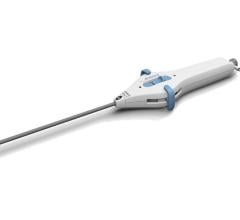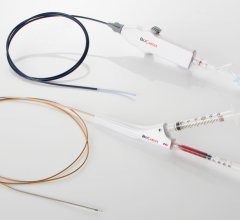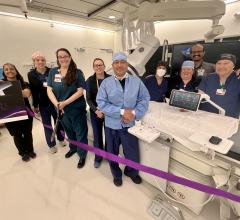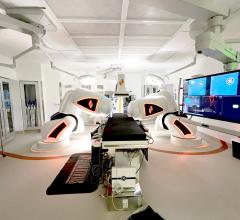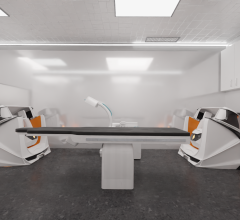
May 13, 2013 — Boston Scientific reports that the four-year follow-up data from the PROTECT AF clinical trial demonstrated the Watchman left atrial appendage (LAA) closure device was statistically superior to warfarin for preventing cardiovascular death, all-cause stroke and systemic embolization. The data demonstrated significant reductions in both cardiovascular and all death compared to warfarin. The data were presented as a late-breaking clinical trial at Heart Rhythm 2013, the Heart Rhythm Society’s 34th Annual Scientific Sessions in Denver, by Vivek Reddy, M.D., a principal investigator of the PROTECT AF trial, and professor of medicine and director of the cardiac arrhythmia services at Mount Sinai School of Medicine in New York. The abstract is titled, “Long Term Results of PROTECT AF: The Mortality Effects of Left Atrial Appendage Closure versus Warfarin for Stroke Prophylaxis in AF.”
Atrial fibrillation (AF) is an irregular heartbeat that can lead to blood clots, stroke, heart failure and other heart-related complications. The condition affects approximately 2.7 million Americans and 15 million people worldwide, and is the most common cause of disabling stroke. A primary treatment goal for AF patients is to reduce the risk of blood clots causing stroke. Patients with AF and additional risk factors for stroke are commonly prescribed blood-thinning medications, also known as anticoagulants, like warfarin, to prevent blood clots from forming in the heart. However, due to blood monitoring requirements, dietary restrictions, side effects and an increased risk of serious bleeding, many patients are unable or unwilling to take these medications for long periods of time. In contrast, the Watchman device is designed to close off the LAA, a major source of clots in patients with AF, and reduce the risk of stroke, potentially eliminating the need for long-term use of blood-thinning medications.
“This is a significant development because for the first time we were able to demonstrate that the Watchman device was superior to warfarin for both primary efficacy and also mortality,” said Reddy. “This has tremendous upside potential for patients. In the PROTECT AF trial, LAA closure with the Watchman device demonstrated the potential for a device-based approach to reduce the risk of stroke in AF patients. As clinicians, we often feel uncomfortable with life-long systemic anticoagulation therapy in patients because of an increased risk of falls and bleeding. The four-year data provide additional support for LAA closure as a potential viable long-term alternative to chronic warfarin therapy for patients to reduce the risk of stroke.”
The PROTECT AF clinical trial is a multicenter, prospective randomized clinical trial designed to demonstrate the safety and effectiveness of the Boston Scientific Watchman device in patients with non-valvular AF who are eligible for warfarin therapy and meet certain stroke risk factors. A total of 707 patients from 59 centers were randomized 2:1 to device or warfarin control.
Results
The PROTECT AF trial achieved superiority for the combined endpoint of all stroke, cardiovascular or unexplained death and systemic embolism.
- The observed primary efficacy event rate was 2.3 percent and 3.8 percent in the Watchman and control groups, respectively, demonstrating a 40 percent relative risk reduction in primary efficacy in the Watchman group (RR = 0.60, posterior probability of superiority = 96 percent).
Secondary analysis also showed a relative risk reduction and superiority to control for all-cause mortality and cardiovascular mortality.
- All-Cause Mortality: the Watchman group was superior to the control group, 3.2 percent to 4.8 percent respectively, representing a 34 percent relative risk reduction in all-cause mortality in the Watchman group (HR = 0.66, p=0.0379).
- Cardiovascular Mortality: the Watchman group was superior to the control group, 1.0 percent and 2.4 percent respectively, representing a 60 percent relative risk reduction in cardiovascular death in the Watchman group (HR = 0.40, p=0.0045).
“This is exciting news for patients with non-valvular AF and a high risk of stroke,” said Kenneth Stein, M.D., chief medical officer, Cardiac Rhythm Management, Boston Scientific. “These data convincingly show that the Watchman device was superior to the current standard of care in these patients and demonstrated its potential to prevent stroke and save lives. The Watchman device underscores the Boston Scientific commitment to meaningful innovation and to providing the medical community with the tools it needs to improve patients’ lives.”
For more information: www.bostonscientific.com


 January 29, 2026
January 29, 2026 



